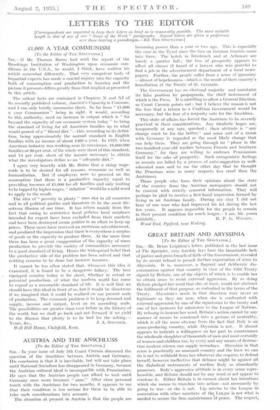LETTERS TO THE EDITOR
[Correspondents are requested to keep their letters as brief as is reasonably possible. The most suitable length is that of one of our " News of the Week " paragraphs. Signed letters are given a preference over those bearing a pseudonym.—Ed. Tun SplierATon.]
£1,000 A YEAR COMMUNISM
[To the Editor of THE SPECTATOR.]
SIR,--.If Mr. Thomas Burns. had read the report of the Brookings Institution of Washington upon economic con- ditions in the U.S.A., he would, I think, have written his 'article somewhat differently. That very competent body of impartial experts has made a careful inquiry into the capacity both of consumption and production, in America and the Picture it presents differs greatly from that implied or presented in this article.
The salient facts are contained in Chapters X and XI of its recently published volume, America's Capacity to Consume, and I can only briefly summarize them. So far from " £1,000 a year Communism " being in sight, it would, according to this authority, need an increase in output which is " far beyond the capacity of our economic system today " to bring the standard of living for all American families up to what would permit of a " liberal diet "—this, according to its defini-' tion, being approximately the normal standard in English families with an income of about £400 a year. In 1929, when American industry was working near its maximum, 19,000,000 families or 90 per cent. of the whole were short of this standard, and 74 per cent. short of the income necessary to obtain what the investigators define as an " adequate diet."
I agree very heartily with Mr. Burns that a rising wage- scale is to. be desired for all reasons, economic as well as humanitarian. But if employers were to proceed on the assumption that there is a productive capacity equal to providing incomes of £1,000 for all families and only waiting to be tapped by higher wages, " inflation " would be a mild word to apply to the result.
The idea of " poverty in plenty " runs riot in all countries and in all political parties and threatens to be the most dis;• astrous illusion of our time. It has arisen mainly from the fact that owing to restrictive fiscal policies local surpluses intended for export have been excluded from their markets and have been destroyed coram publico in an effort to keep up prices. These cases have received an enormous advertisement, and produced the impression that there is everywhere a surplus of goods or the capacity to produce them. At the same time there has been a great exaggeration of the capacity of mass production to provide the variety of commodities necessary to a good standard of living. Hence the widespread belief that the productive side of the problem has been solved and that nothing remains to be done but increase incomes.
It cannot be too often stated that, whenever this idea is examined, it is found to be a dangerous fallacy. The best equipped country today is far short, whether in actual or potential production, of what the modern world has come to regard as a reasonable standard of life. It is well that we should have this ideal in front of us, but it would be disastrous if we imagined that it could be realized on our present scale of production. The economic problem is to keep demand and supply, income and output, level on an ascending scale. The possibilities are greater than ever before in the history of the world, but we shall go back and not forward if we yield' to the illusion that plenty is to • be had for the asking.—
Yours, &c., J. A. SPENDER. Well Hill House, Chelsfield, Kent.






































 Previous page
Previous page